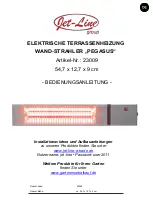
www.camplux.com
1
7
Visit Us: Camplux.com
3330-A Marathon Ct Charleston, SC 29418
(844) 538-7475
● No attempt should ever be made to convert the water heater from natural gas
to propane gas. To avoid possible equipment damage, personal injury or fire,
do not connect the water heater to a fuel type not in accordance with the unit
data plate; propane for propane units and natural gas for natural gas units.
These units are not certified for any other fuel type.
● Propane water heaters should not be installed below grade (for example, in a
basement) if such installation is prohibited by federal, state and/or local laws,
rules, regulations or customs.
● Propane or propane gas must be used with great caution. It is heavier than air
and will collect first in lower areas making it hard to detect at nose level.
● Before attempting to light the water heater, make sure to look and smell for gas
leaks. Use a soapy solution to check all gas fittings and connections. Bubbling
at a connection indicates a leak that must be corrected. When smelling to
detect a gas leak, be sure to sniff near the floor also.
● It is recommended that more than one method, such as soapy solution, gas
detectors, etc., be used to detect leaks in gas applications.
NOTICE:
If a gas leak is present or suspected:
● DO NOT attempt to find the cause yourself.
● DO NOT try to light any appliance.
● DO NOT touch any electrical switch.
● DO NOT use any phone in your building.
● Leave the house immediately and make sure your family and pets leave also.
● Leave the doors open for ventilation and contact the gas supplier, a qualified
service agency or the fire department.
● Stay away from the house(or building) until the service call has been made, the
leak is corrected and a qualified agency has determined the area to be safe.
● Follow the steps listed under “WHAT TO DO IF YOU SMELL GAS” found on
Page 8 of this manual.
WARINING
●
The installation of gas piping must comply with local utility company
requirements and/or in the absence of local codes, use the latest edition of
National Fuel Gas Code(NFGC), ANSI Z223.1/NFPA 54.
● If inlet gas pressure is out of allowable range (8.0″w.c(2.0kPa)-13.0″w.c.(3.2kPa)
for propane gas, a gas pressure regulator must be installed to maintain the
allowable inlet gas pressure.
● Should overheating occur or the gas supply fail to shut off, turn off the manual
gas control valve to the water heater.









































